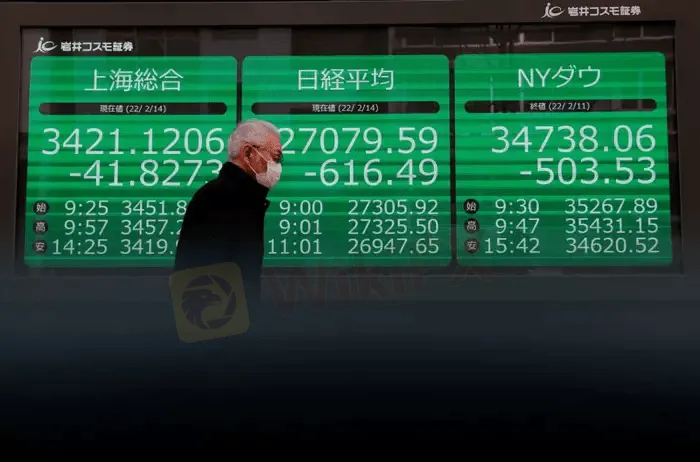简体中文
繁體中文
English
Pусский
日本語
ภาษาไทย
Tiếng Việt
Bahasa Indonesia
Español
हिन्दी
Filippiiniläinen
Français
Deutsch
Português
Türkçe
한국어
العربية
Asian stocks slide with oil on recession jitters; dollar drops
Abstract:Asia stocks continued a decline from Wall Street on Tuesday, and U.S. long-term Treasury yields sank to a four-month low, pulling the U.S. dollar down against the yen and other currencies as investors worried about the risk of global recession.

There were also jitters about an escalation in Sino-U.S. tension with U.S. House of Representatives Speaker Nancy Pelosi set to begin a visit to Taiwan against the objections of China, which regards the self-governed island as a breakaway province.
Australian equities declined amid an uncertain outlook for commodity demand – which also weighed on crude oil prices – while the local dollar hovered near its highest versus its U.S. counterpart since mid-June with the central bank widely expected to deliver a third consecutive half-point interest rate hike later in the day.
The Australian and South Korean equity benchmarks suffered losses of about 0.3% each, while Japans Nikkei tumbled 1.17%.
Chinese blue chips dropped 1.06% and Hong Kongs Hang Seng lost 1.1%.
Taiwans stock index slid 1.68%.
MSCIs broadest index of Asia-Pacific shares retreated 0.8%.
U.S. e-mini stock futures pointed to a 0.31% lower restart for the S&P 500, which stumbled 0.28% overnight.
The week began with China, Europe and the United States reporting weakening factory activity, with that in the U.S. decelerating to its lowest level since August 2020.
That sank crude, with Brent futures edging down to $99.74 on Tuesday after losing almost $4 overnight. U.S. West Texas Intermediate futures also eased to $93.67, extending Mondays almost $5 slide.
“Data releases over the past 24 hours have provided further evidence the global economy is slowing,” National Australia Bank strategist Rodrigo Catril wrote in a note to clients.
“Signs of a slowdown are building” in the United States, while “Chinas reopening activity burst is over,” he said.
The benchmark 10-year U.S. Treasury yield fell as low as 2.53% in Tokyo trade, the lowest since April 5, amid wagers the slowdown could spur the U.S. Federal Reserve to ease its foot off the policy-tightening pedal. The bonds also benefited from safety-seeking demand before Pelosis Taiwan visit, analysts said.
That helped the U.S. dollar slide as low as 130.595 yen for the first time since June 6. The euro jumped as high as $1.0294, a level not seen since July 5.
The Taiwan dollar slipped to its lowest level in more than two years on the weaker side of 30 per U.S. dollar.
Meanwhile, the Aussie was more subdued, retreating 0.26% to $0.7009, but after hitting the highest since June 17 at $0.7048 in the previous session.
Analysts polled by Reuters expect the Reserve Bank of Australia to hike by 50 basis points both on Tuesday and again at its next meeting in September as it races to rein in inflation.
Market participants also see a half-point bump later as a certainty, and have priced an additional 37 basis points of tightening for the September decision.

Disclaimer:
The views in this article only represent the author's personal views, and do not constitute investment advice on this platform. This platform does not guarantee the accuracy, completeness and timeliness of the information in the article, and will not be liable for any loss caused by the use of or reliance on the information in the article.
Read more

Webull and Others Fined $275,000 for Incomplete Suspicious Activity Reports
Webull Financial, alongside Lightspeed Financial Services Group and Paulson Investment Company, LLC, has agreed to pay a collective fine of $275,000 following an investigation by the US Securities and Exchange Commission (SEC). The penalty was issued due to the firms’ failure to include essential information in suspicious activity reports (SARs) over a four-year period.

Barclays Resolves £40M Fine Over 2008 Fundraising Disclosure Failures
Barclays has reached a settlement with the UK’s Financial Conduct Authority (FCA), agreeing to pay a £40 million fine for failing to adequately disclose arrangements with Qatari investors during its critical fundraising efforts amidst the 2008 financial crisis.

WikiEXPO Global Expert Interview: Advanced Practices and Insights in Financial Regulation
In the midst of rapid advancements and evolving landscapes in financial technology, financial regulation, and ensuring financial security, WikiGlobal stands at the forefront, closely tracking these transformative trends. As we embark on our series of exclusive interviews focusing on these pivotal areas, we are delighted to have had an in-depth conversation with.

Alleged Concerns with TradeEU.global's Trading Practices
An individual trader has come forward with allegations of an unfavourable experience while using the services of the broker TradeEU.global.
WikiFX Broker
Latest News
Saxo & Portuguese Bank Partnership
SEC Fines Broker-Dealers $275K for Incomplete SAR Filings
Elon Musk Warns of Imminent US Bankruptcy | Bitcoin Retreats from $100K
UK FCA Fines Barclays £40 Million Over 2008 Deal
WikiEXPO Global Expert Interview: Advanced Practices and Insights in Financial Regulation
Justin Sun Invests $30M in Trump-Backed World Liberty Financial
Lured by False Promises: Malaysian Driver Lost RM218K to an Investment Scam
FTX Sets March 2025 Timeline for Creditor Payouts: What It Means for Investors
What is an Economic Calendar? How it works
Pros & Cons of Automated Forex Trading
Currency Calculator


